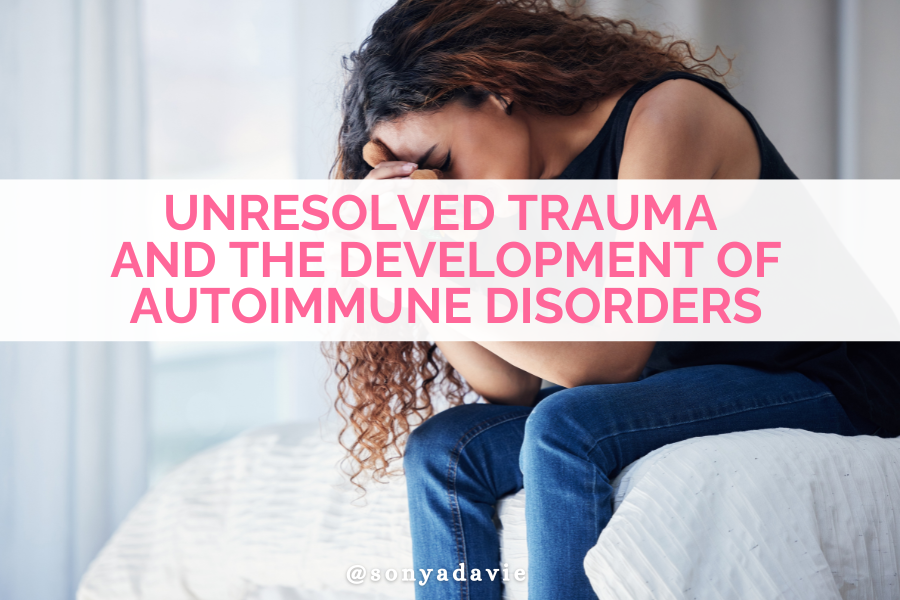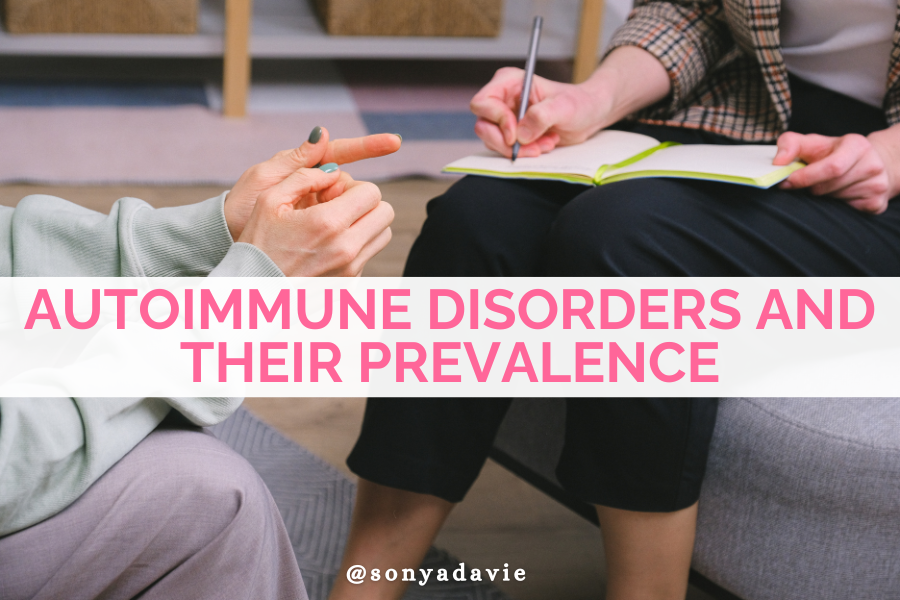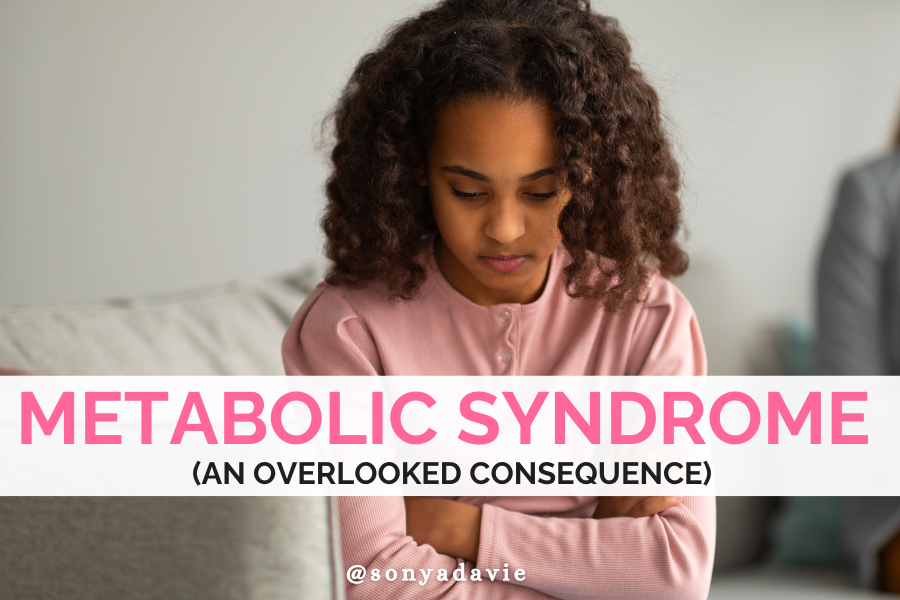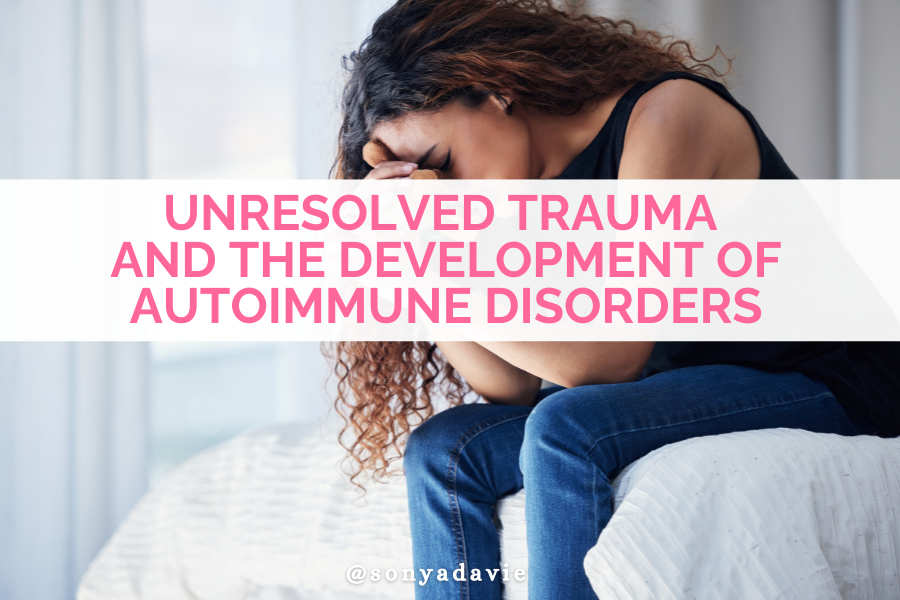The connection between unresolved trauma and the development of autoimmune disorders is a growing field of interest in medical research.
Research shows a strong link between past trauma—especially childhood adversity—and autoimmune diseases like lupus, rheumatoid arthritis, and multiple sclerosis.
And if you’re a Black woman, the impact is even more significant.
It’s frustrating, right? You go to the doctor, hoping for answers, but sometimes it feels like they’re only treating the symptoms—not getting to the root cause. The reality is, mainstream healthcare rarely talks about how trauma can trigger chronic stress, inflammation, and immune system dysfunction.
But…understanding this connection is a game changer.

This post is all about trauma and autoimmune disorders.
The Science Behind Trauma and Autoimmune Disorders
When you experience trauma, especially if it’s never fully processed or resolved, your body stays in a state of high alert. Your stress response—controlled by the hypothalamic-pituitary-adrenal (HPA) axis—keeps pumping out cortisol.
In the short term, this helps you survive. But when stress becomes chronic, it throws your immune system out of balance, making you more susceptible to autoimmune diseases.
And studies have found that people with high Adverse Childhood Experience (ACE) scores are much more likely to develop conditions like lupus and rheumatoid arthritis. (Source)
Autoimmune Disorders and Their Prevalence
Did you know that nearly 80% of autoimmune disease cases affect women? And when you look specifically at Black women, the numbers are even more concerning.
For example:
- Black women are three times more likely to develop lupus compared to white women—and they often experience more severe symptoms.
- They are also at higher risk for multiple sclerosis, rheumatoid arthritis, and Graves’ disease.
- And due to systemic healthcare disparities, Black women often face delayed diagnoses and less aggressive treatment options compared to other groups.

If you’ve ever felt dismissed or unheard when seeking medical care, you’re definitely not alone.
This is one of the many reasons why it’s so important to advocate for yourself and look at your health through a holistic lens—one that includes both physical and emotional healing.
The Role of Psychotherapy and the Cultural Barriers
Black women have historically been less likely to seek therapy, often growing up with messages like:
- “Be strong.”
- “You just have to push through.”
- “Therapy is for other people, not us.”
On top of that, there’s a deep mistrust of the healthcare system.
Generations of medical racism have left many Black women feeling like traditional healthcare doesn’t fully serve them.
So instead, they often lean on spirituality, and community, or even bury their feelings to cope with trauma. The problem? When trauma isn’t processed, it doesn’t just disappear—it lingers in the body, increasing your risk for chronic illness.
Metabolic Syndrome (An Overlooked Consequence)
Another hidden consequence of unhealed trauma is metabolic syndrome—a cluster of conditions that includes obesity, high blood pressure, and insulin resistance.
Studies show that people with high ACE scores have a 46% higher risk of developing metabolic syndrome. And since Black women have higher rates of both ACEs and metabolic syndrome, the stakes are even higher.

When your body is constantly in fight-or-flight mode due to unresolved trauma, it affects your blood sugar regulation and increases inflammation—two key factors in developing autoimmune disorders like type 1 diabetes and Hashimoto’s thyroiditis.
How to Start Healing: A Holistic Approach
If any of this sounds familiar, don’t lose hope. Healing is possible. And it starts with a whole-body approach that prioritizes both your emotional and physical well-being.
Here are some steps you can take:
- Advocate for Trauma-Informed Care
Next time you see a doctor, ask about trauma screenings. More healthcare providers are starting to recognize the connection between trauma and chronic illness—but sometimes, you have to bring it up first. - Find Therapy That Respects Your Culture
If traditional therapy hasn’t worked for you, look into culturally competent therapists who understand your background and experiences. Therapy should feel safe—not like another battle you have to fight. - LifestyleInterventions
Mind-body practices such as yoga, meditation, and anti-inflammatory diets aren’t just trendy—they help regulate your nervous system and reduce autoimmune flare-ups.
- Push for Policy Changes
Change doesn’t happen overnight, but we need to keep pushing for better healthcare access, education, and systemic forms—especially for marginalized communities.
You Deserve to Feel Better!!!
Your past experiences do not define your future health. If you’ve been dealing with an autoimmune disorder, it’s time to start looking at the bigger picture—one that includes not just your body, but also your mind and past experiences.
Healing isn’t just about managing symptoms; it’s about reclaiming your health, your voice, and your well-being.
Powerful Books to Guide Your Journey:
If you’re looking for a good read that explores trauma and supports your healing, here are three powerful resources that offer comfort, clarity, and practical tools to help you move forward.
1. Emotional Self-Care for Black Women by Alicia Magoro
Black women face unique challenges—discrimination, microaggressions, and societal pressure often make emotional well-being an afterthought. This book is a must-read for reclaiming your peace and prioritizing self-care. If you’re feeling emotionally drained or burnt out, this book offers practical strategies to help you feel whole again. Grab your copy today!
2. The Body Keeps the Score by Bessel van der Kolk, M.D.
Dr. Bessel van der Kolk unpacks how past experiences shape emotional responses and physical health. This book is a game-changer for anyone struggling with trauma’s lasting effects. Check this out today!

3. Running on Empty by Jonice Webb
Do you ever feel emotionally disconnected but don’t know why? This book explores childhood emotional neglect—a silent form of trauma that can shape relationships, self-worth, and happiness.
If you’ve ever felt like something is missing but can’t put your finger on it, this book can help provide the clarity you need. Get your copy now!
Healing isn’t one-size-fits-all, and each of these books offers a different approach to understanding and overcoming trauma. Whether you need self-care tips, scientific insights, or emotional clarity, these reads can be a powerful first step.
Which book speaks to you the most? Pick one up and start your journey today!
Take control of your health and start moving toward lasting wellness.

This post is all about trauma and autoimmune disorders.
+ show Comments
- Hide Comments
add a comment